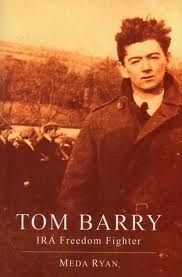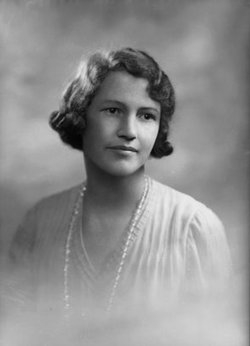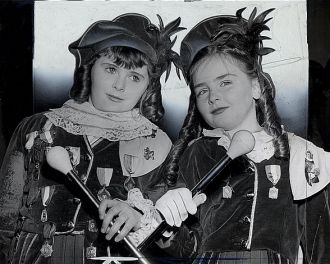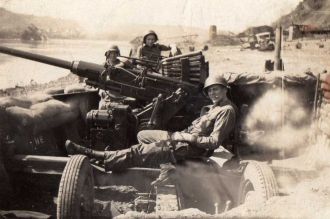Tom Barry, Ireland 1916
Barry was born in Killorglin, County Kerry. He was the son of a Royal Irish Constabulary policeman. Four years later, Thomas Barry Senior resigned and opened a business in his hometown of Rosscarbery, County Cork.[1] Barry was educated for a period at Mungret College, County Limerick from 25 August 1911 to 12 September 1912. The reason for his short stay is indicated by a reference from the school register of the Apostolic School, Mungret College; 'Went - Home (ran away) without knowledge of superiors - no vocation'.[2]
In 1915, during World War I, he enlisted in the Royal Field Artillery at Cork and became a soldier in the British Army.
“ In June, in my seventeenth year, I had decided to see what this Great War was like. I cannot plead I went on the advice of John Redmond or any other politician, that if we fought for the British we would secure Home Rule for Ireland, nor can I say I understood what Home Rule meant. I was not influenced by the lurid appeal to fight to save Belgium or small nations. I knew nothing about nations, large or small. I went to the war for no other reason than that I wanted to see what war was like, to get a gun, to see new countries and to feel a grown man. Above all I went because I knew no Irish history and had no national consciousness.[3] ”
He fought in Mesopotamia (then part of the Ottoman Empire, present day Iraq). He rose to the rank of sergeant.[4] Barry was offered a commission in the Royal Munster Fusiliers but refused it.[citation needed] While outside Kut-el-Amara Barry first heard of the Easter Rising.
On his return to Cork he was involved with ex-servicemen's organisations. In 1920, Barry joined the 3rd (West) Cork Brigade of the Irish Republican Army (IRA) which was then engaged in the Irish War of Independence (1919–1921). He was involved in brigade council meetings, was brigade-training officer, flying column commander, was consulted by IRA General Headquarters Staff (GHQ), and also participated in the formation of the IRA First Southern Division. The West Cork Brigade became famous for its discipline, efficiency and bravery, and Barry garnered a reputation as the most brilliant field commander of the war.
On 28 November 1920, Barry's unit ambushed and killed almost a whole platoon of British Auxiliaries at Kilmichael, County Cork. In March 1921 at Crossbarry in the same county, Barry and 104 men, divided into seven sections, broke out of an encirclement of 1,200 strong British force from the Essex Regiment. In total, the British Army stationed over 12,500 troops in County Cork during the conflict, while Barry's men numbered no more than 310. Eventually, Barry's tactics made West Cork ungovernable for the British authorities.
"They said I was ruthless, daring, savage, blood thirsty, even heartless. The clergy called me and my comrades murderers; but the British were met with their own weapons. They had gone in the mire to destroy us and our nation and down after them we had to go."[5]
In 1915, during World War I, he enlisted in the Royal Field Artillery at Cork and became a soldier in the British Army.
“ In June, in my seventeenth year, I had decided to see what this Great War was like. I cannot plead I went on the advice of John Redmond or any other politician, that if we fought for the British we would secure Home Rule for Ireland, nor can I say I understood what Home Rule meant. I was not influenced by the lurid appeal to fight to save Belgium or small nations. I knew nothing about nations, large or small. I went to the war for no other reason than that I wanted to see what war was like, to get a gun, to see new countries and to feel a grown man. Above all I went because I knew no Irish history and had no national consciousness.[3] ”
He fought in Mesopotamia (then part of the Ottoman Empire, present day Iraq). He rose to the rank of sergeant.[4] Barry was offered a commission in the Royal Munster Fusiliers but refused it.[citation needed] While outside Kut-el-Amara Barry first heard of the Easter Rising.
On his return to Cork he was involved with ex-servicemen's organisations. In 1920, Barry joined the 3rd (West) Cork Brigade of the Irish Republican Army (IRA) which was then engaged in the Irish War of Independence (1919–1921). He was involved in brigade council meetings, was brigade-training officer, flying column commander, was consulted by IRA General Headquarters Staff (GHQ), and also participated in the formation of the IRA First Southern Division. The West Cork Brigade became famous for its discipline, efficiency and bravery, and Barry garnered a reputation as the most brilliant field commander of the war.
On 28 November 1920, Barry's unit ambushed and killed almost a whole platoon of British Auxiliaries at Kilmichael, County Cork. In March 1921 at Crossbarry in the same county, Barry and 104 men, divided into seven sections, broke out of an encirclement of 1,200 strong British force from the Essex Regiment. In total, the British Army stationed over 12,500 troops in County Cork during the conflict, while Barry's men numbered no more than 310. Eventually, Barry's tactics made West Cork ungovernable for the British authorities.
"They said I was ruthless, daring, savage, blood thirsty, even heartless. The clergy called me and my comrades murderers; but the British were met with their own weapons. They had gone in the mire to destroy us and our nation and down after them we had to go."[5]
Date & Place:
in Cork County, Cork Ireland

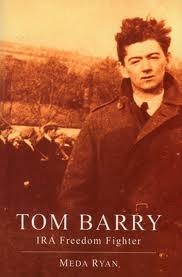
 Kevin Barry
Kevin Barry 
